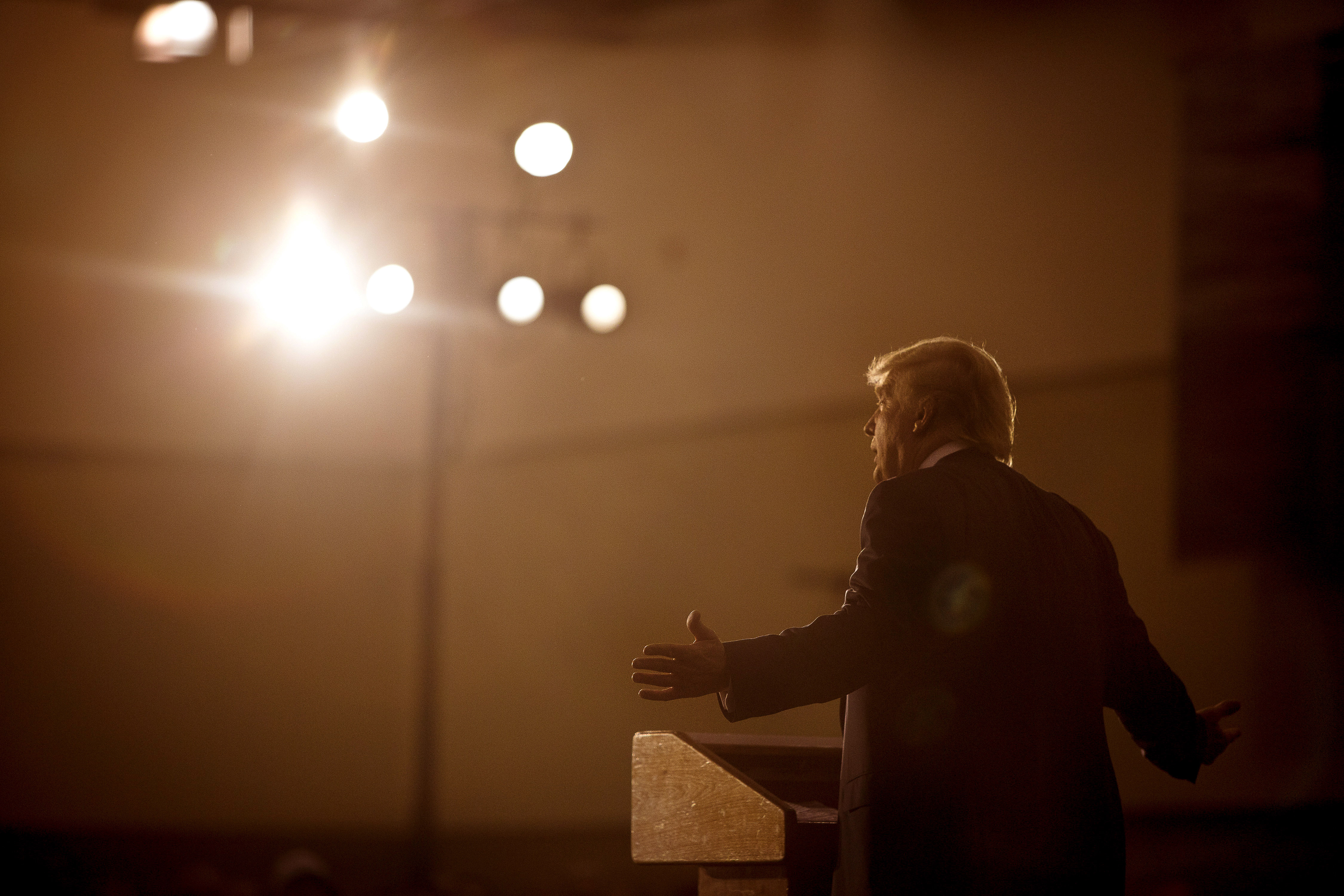The appeal of Trump: Why immigration may be the defining issue of the 21st century
As borders break down, there may be more Trumps on the horizon


There was once a fanciful idea that the internet and all its attendant technologies of cheap communication would reverse the pattern of urbanization in developed countries. Some people still believe this: People could telecommute to work while enjoying the comforts of the small towns and country roads of their childhood. A few people, in fact, do this. But the for the most part the opposite phenomenon is playing out. The information age is the age of moving people. And if that's true, Donald Trump is just the first manifestation of a new era in global politics.
The information age makes it very easy for a small town kid to find an apartment, a job, and a social network in the big cities and growth areas. It also allows him to stay connected with friends at home. In other words, it lowers the price of moving and the cost of leaving. It reduces the feeling of disorientation in new places, while allowing people to still belong, in some sense, to where they came from. New York, Los Angeles, D.C., Silicon Valley, Portland, and Austin have all benefited from these trends.
And the truth is that this is a global phenomenon. It's easier than ever to establish social, commercial, and employment relationships in places thousands of miles away from you. So why not go there? According to the U.N.'s figures, by 2013 the number of emigrants from the Global South that emigrated to the Global North was equal to the number of emigrants in the Global South that emigrated within the Global South. One of every nine Africans with a tertiary diploma was living in one of the elite nations in the Organization for Economic Cooperation and Development (OECD). It's not a coincidence that Trump is surging ahead because of his anti-immigration views in America, while Europe is roiled by debates over how to handle migrants crossing the Mediterranean.
The Week
Escape your echo chamber. Get the facts behind the news, plus analysis from multiple perspectives.

Sign up for The Week's Free Newsletters
From our morning news briefing to a weekly Good News Newsletter, get the best of The Week delivered directly to your inbox.
From our morning news briefing to a weekly Good News Newsletter, get the best of The Week delivered directly to your inbox.
This, incidentally, is why I am convinced that there was no way that the GOP could have precluded the Donald Trump moment in American politics by passing comprehensive immigration reform two years ago. The movement of people from country to the city, from poor nations to richer nations, from the Global South to the Global North, may be the great political problem of the next age in global development. Just as the building of trade routes and the maintenance of empires defined the mercantile age, then the construction of a political economy (capitalist or socialist) became the major problem of the industrial age, the mass movement of people may be the defining issue of whatever we're calling the information age.
If that's the case, it's no surprise that the coalitions and ideologies that were put together for 20th century problems seem to be vulnerable now. The people attached to them may sound like those who once extolled the glories of empire in the 1950s, when the world was deep into heated debates about the inevitability of communism.
Look at the Labour Party in Britain. The center of gravity for the party has shifted too heavily in the direction of cosmopolitan London interests. The party's traditional base in Scotland among Tory-haters and in English coasts among the working classes has been partly stolen by a combination of Scottish and English nationalists. What do struggling working-class voters care about Labour's obsession with appealing to the immigrants who are displacing them?
Because most media members are on the center-left and attached to cosmopolitan interests, they view anxiety about immigration as an exclusively right-wing phenomenon. That considerably oversimplifies the matter. The insurgent, anti-immigrant "right-wing" European parties steal considerable numbers of their voters from traditionally left-wing voting blocs. Often these parties are indifferent to throne-and-altar Christianity. They cast themselves as defenders of secularism against left-wing-enabled Islamization of European ghettos. Sometimes they cast themselves as the saviors of the European welfare state, against a globalist elite that likes immigration and looks down on the imagined laziness and inflexibility of struggling native workforces. The rich (on left and right) in the West are formed by the half-correct perception: "I'm working 80-hour weeks, and these (less valuable) people want union-style work rules?"
A free daily email with the biggest news stories of the day – and the best features from TheWeek.com
The divide is not just between voters who are vulnerable to economic and cultural competition and the political class that enjoys cheap labor. It will also pit the developing world against the developed world. Trump says that Mexico is exporting its problems to the U.S. But the truth is that, along with some problems, the Global South (particularly Africa) is sending its prodigies abroad, many of them never to return. Those nations may begin to see their investments in education as an indirect subsidy to nations much richer than their own. Poorer nations will not just compete, but may fight, to retain their best and brightest citizens and subjects. China is already the world leader in internal migration controls.
If the old ideologies no longer make sense, it's not a surprise that a GOP elite dominated by cosmopolitan, pro-immigration Wall Streeters is getting winded in its attempt to chase after the Republican base, which wants government hands off their Medicare and a few 30-foot walls along the Mexican border. Trump may turn out to be a blip in this election cycle. But some days Trumpism looks like the future. Instead of parties divided by questions of political economy — crudely speaking, socialism or capitalism — we may be having debates between the globalized economy and actual communities: market or nation. The character of cities and places will be put against the demands of an invisible hand. Parties committed to diversity and breaking up the traditional cultures of their nations will find themselves allied with big business and the engines of the global market. Parties committed to preserving the national character may find themselves defending the 20th century's legacy of national welfare states.
In other words, get ready for a hyper-capitalist left and an anti-capitalist right.
Michael Brendan Dougherty is senior correspondent at TheWeek.com. He is the founder and editor of The Slurve, a newsletter about baseball. His work has appeared in The New York Times Magazine, ESPN Magazine, Slate and The American Conservative.
-
 The 8 best spy movies of all time
The 8 best spy movies of all timethe week recommends Excellence in espionage didn’t begin — or end — with the Cold War
-
 Why scientists want to create self-fertilizing crops
Why scientists want to create self-fertilizing cropsUnder the radar Nutrients without the negatives
-
 Are pesticides making florists sick?
Are pesticides making florists sick?Under the Radar Shop-bought bouquets hide a cocktail of chemicals
-
 The billionaires’ wealth tax: a catastrophe for California?
The billionaires’ wealth tax: a catastrophe for California?Talking Point Peter Thiel and Larry Page preparing to change state residency
-
 Bari Weiss’ ‘60 Minutes’ scandal is about more than one report
Bari Weiss’ ‘60 Minutes’ scandal is about more than one reportIN THE SPOTLIGHT By blocking an approved segment on a controversial prison holding US deportees in El Salvador, the editor-in-chief of CBS News has become the main story
-
 Has Zohran Mamdani shown the Democrats how to win again?
Has Zohran Mamdani shown the Democrats how to win again?Today’s Big Question New York City mayoral election touted as victory for left-wing populists but moderate centrist wins elsewhere present more complex path for Democratic Party
-
 Millions turn out for anti-Trump ‘No Kings’ rallies
Millions turn out for anti-Trump ‘No Kings’ ralliesSpeed Read An estimated 7 million people participated, 2 million more than at the first ‘No Kings’ protest in June
-
 Ghislaine Maxwell: angling for a Trump pardon
Ghislaine Maxwell: angling for a Trump pardonTalking Point Convicted sex trafficker's testimony could shed new light on president's links to Jeffrey Epstein
-
 The last words and final moments of 40 presidents
The last words and final moments of 40 presidentsThe Explainer Some are eloquent quotes worthy of the holders of the highest office in the nation, and others... aren't
-
 The JFK files: the truth at last?
The JFK files: the truth at last?In The Spotlight More than 64,000 previously classified documents relating the 1963 assassination of John F. Kennedy have been released by the Trump administration
-
 'Seriously, not literally': how should the world take Donald Trump?
'Seriously, not literally': how should the world take Donald Trump?Today's big question White House rhetoric and reality look likely to become increasingly blurred
